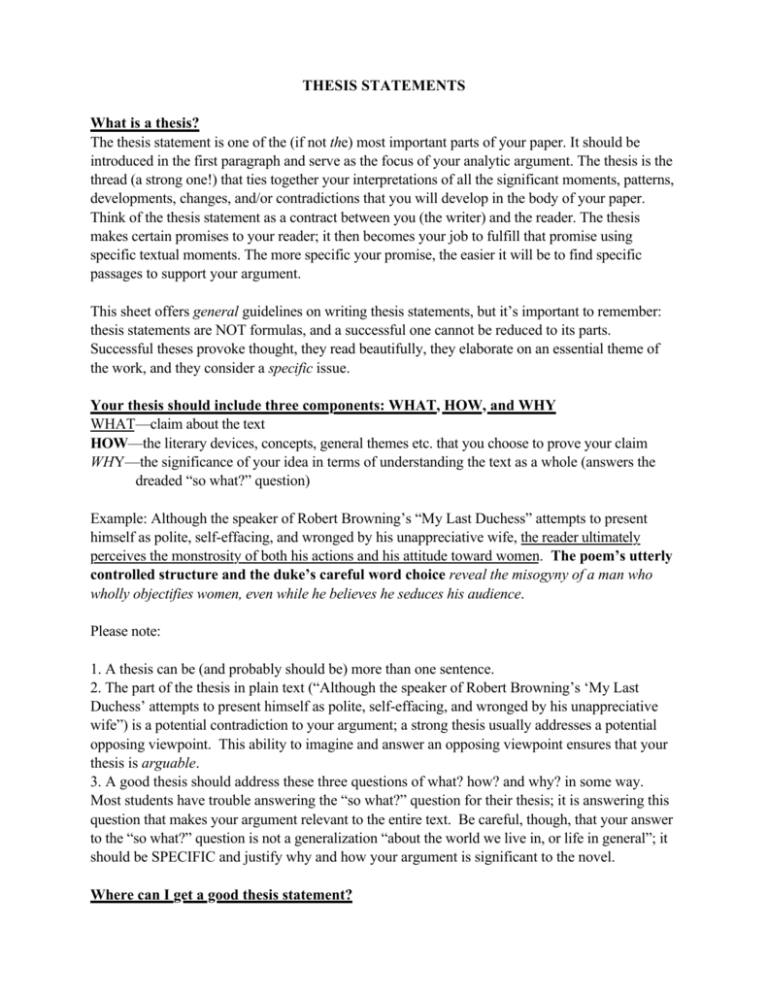THESIS STATEMENTS What is a thesis? The thesis statement is
advertisement

THESIS STATEMENTS What is a thesis? The thesis statement is one of the (if not the) most important parts of your paper. It should be introduced in the first paragraph and serve as the focus of your analytic argument. The thesis is the thread (a strong one!) that ties together your interpretations of all the significant moments, patterns, developments, changes, and/or contradictions that you will develop in the body of your paper. Think of the thesis statement as a contract between you (the writer) and the reader. The thesis makes certain promises to your reader; it then becomes your job to fulfill that promise using specific textual moments. The more specific your promise, the easier it will be to find specific passages to support your argument. This sheet offers general guidelines on writing thesis statements, but it’s important to remember: thesis statements are NOT formulas, and a successful one cannot be reduced to its parts. Successful theses provoke thought, they read beautifully, they elaborate on an essential theme of the work, and they consider a specific issue. Your thesis should include three components: WHAT, HOW, and WHY WHAT—claim about the text HOW—the literary devices, concepts, general themes etc. that you choose to prove your claim WHY—the significance of your idea in terms of understanding the text as a whole (answers the dreaded “so what?” question) Example: Although the speaker of Robert Browning’s “My Last Duchess” attempts to present himself as polite, self-effacing, and wronged by his unappreciative wife, the reader ultimately perceives the monstrosity of both his actions and his attitude toward women. The poem’s utterly controlled structure and the duke’s careful word choice reveal the misogyny of a man who wholly objectifies women, even while he believes he seduces his audience. Please note: 1. A thesis can be (and probably should be) more than one sentence. 2. The part of the thesis in plain text (“Although the speaker of Robert Browning’s ‘My Last Duchess’ attempts to present himself as polite, self-effacing, and wronged by his unappreciative wife”) is a potential contradiction to your argument; a strong thesis usually addresses a potential opposing viewpoint. This ability to imagine and answer an opposing viewpoint ensures that your thesis is arguable. 3. A good thesis should address these three questions of what? how? and why? in some way. Most students have trouble answering the “so what?” question for their thesis; it is answering this question that makes your argument relevant to the entire text. Be careful, though, that your answer to the “so what?” question is not a generalization “about the world we live in, or life in general”; it should be SPECIFIC and justify why and how your argument is significant to the novel. Where can I get a good thesis statement? In a crunch, use the Magic Thesis Statement (but adapt it!): By looking at HOW (evidence to prove the claim), we can see WHAT (your claim about the text), and this is important because WHY. Some Problems with Thesis Statements The plot summary thesis: This poem shows the narrator comparing his lover to a summer’s day. Proving the universal: “Shall I Compare Thee to a Summer’s Day?” presents the power of love to conquer death. The overly general thesis: Shakespeare’s sonnets reveal how narratives can last in ways that nature cannot. [Note: if you can plug another text into your thesis, your thesis is probably too general.] The cliché thesis: “Shall I Compare Thee to a Summer’s Day?” proves the point that the pen is mightier than the sword. The list thesis: The structure, character, and dialogue in this poem show us how all humans search for knowledge. [Nothing technically “wrong” with this thesis, but it’s really boring! This is a great place to start with a thesis statement; then expand and/or finesse the what? how? and why? components.] The reader-response thesis (as an unhelpful way of dealing with the “so what?”): Shakespeare’s sonnets show how the narrator compares poetry favorably to nature to get the reader to understand how narrative lasts forever. [All texts are addressed somehow to readers. This is not an analytical point.] Successful thesis: Despite its seeming emphasis on love and physical beauty—traits that are often considered fleeting—Shakespeare’s sonnet “Shall I Compare Thee to a Summer’s Day?” reveals the ways in which humans, despite our mortality, can triumph over the vagaries of nature. The images that the narrator uses and the structure of the sonnet itself help to privilege the power of narrative as a means of asserting our dominance over nature. Why is it successful? • It’s specific. • It addresses a potential contradiction and is arguable. • It provides a logical way to structure the argument. • It’s fairly daring intellectually and has an interesting “so what?” • Can you identify the various components?






